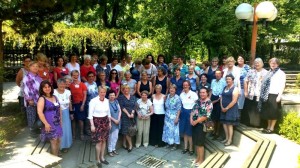Andante Summer School, 12 – 16 August, 2015
“WHY BIOETHICS? – BIOETHICAL ISSUES FACING PEOPLE TODAY”
I attended the Andante Summer School in August as a RENATE member. It was a great privilege to be there at the Don Bosco house in Vienna, Austria where the event took place in a picturesque part of Vienna close to the famous Wienerwald (the Vienna Woods). The theme: “Why bioethics? – Bioethical issues facing people today.”
Andante (The European Alliance of Catholic women`s organisations) proposed this topic at the request of several members from different countries in Europe who face Bioethical issues related to their work or to their personal life.
We were 54 people in total, from different European countries, with diverse backgrounds and different ways of answering or dealing with difficult questions and decisions regarding Bioethics.
As an Alliance of Catholic Women, Andante meetings had its focus on the Christian aspects of the discussions, underpinned all the while by consideration for the dignity of the human person, which cannot be reduced to the outward appearance of the body, but is a holistic complex of body and soul.
Dr. Sigrid Sterckx from Belgium, gave an introduction to ethics on the first day. She is Professor of Ethics and Political and Social Philosophy at the Department of Philosophy and Moral sciences at Ghent University. In her introduction, her central point was the question: What should I do? We were given explanations on several approaches to normative ethics like: utilitarism, deontology and virtue ethics, with particular attention to the (in)/compatibilities between them, illustrated with several examples. All of which challenged the way we react in critical situations.
After this amazing way of putting us in front of the reality some people live in daily life, we discussed the ethical aspects of various medical end-of-life practices such as pain and symptom alleviation, continuous sedation at the end of life, physician-assisted suicide and euthanasia and the differences and similarities between them.
Dr. Myriam Wijlens from the Netherlands, Professor of Canon Law and Ecumenism at the Erfurt University in Germany spoke on Ethics and Canon Law. She payed particular attention to the issue of abortion and the question of when the penalty of an automatic excommunication on Canon Law is indeed occurred, or if it ever occurred.
She said, “Development in the area of medicine requires not only ethical reflections but also leads to questions that touch on actions and reactions within the realm of pastoral ministry. It is not uncommon that a tension arises between the doctrine and the teaching on the one side and pastoral care with regard to an individual specific person on the other side.”
Dr. Regula Ott, Professor of Ethics at University of Zurich, Switzerland, gave a talk on Ethical Issues for prospective parents.
In her presentation she addressed aspects related to biomedical ethics for parents, explained closely the terms of artificial insemination, prenatal diagnosis that employs a variety of techniques to determine the health and condition of an unborn fetus, about Preimplantation genetic diagnosis (PGD) which is a reproductive technology that can be used for diagnosis of a genetic disease in early embryos prior to implantation and pregnancy. In addition, this technology can be utilised in the field of assisted reproduction for aneuploidy screening and diagnosis of unbalanced inheritance of chromosome abnormalities, such as translocations or inversions, all these from the perspective of biomedical ethics.
Dr. Sigrid Müller, Germany, talked about the relationship between Ethics, Culture and Faith/Spirituality, emphasising the pluralism and the decreasing influence the Churches or religions face in Europe today. She is Dean at the Catholic Theological Faculty of Vienna. World views are increasingly dominated by paradigms used in the field of technology, technique and neutral sciences, in a context where arguments traditionally offered by the churches are often no longer accepted, she said.
All meetings started with a prayer and the song Laudato Si, prayer of Saint Francis. The entire meeting was underpinned by the influence of the Pope Francis’ Encyclical letter Laudato Si’ – care for our common home.
I am very grateful for such an enriching experience both from the speakers and from participants.
I would like to finish with part of the second prayer at the end of the Encyclical, where we, Christians, ask for inspiration to take up the commitment to creation set before us by the Gospel of Jesus.
O Lord, seize us with your power and light,
help us to protect all life,
to prepare for a better future,
for the coming of your Kingdom
of justice, peace, love and beauty.
Praise be to you!
Amen
Sr. Adina Balan, CJ – Bucharest
Andante Summer School Summary 2015_English

.png)




